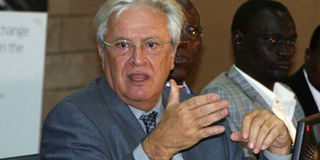How weak internal capacity is blunting UN’s housing agency

Dr Joan Clos, Executive Director of UN-Habitat, addresses a County Governors and Urban Development Executives’ Leadership Conference at the agency's headquarters in Gigiri on November 2, 2015. Many of the organisation’s flagship reports have died under Mr Clos’ tenure. PHOTO | NATION MEDIA GROUP
What you need to know:
- Influential European countries pressured Mr N’Dow to leave after he was accused of mishandling donor money.
- UN-Habitat’s key strengths — data gathering and advocacy — seem to have floundered under Clos' leadership.
When I joined the United Nations Human Settlements Programme (or UN-Habitat, which was then called the UN Centre for Human Settlements) in 1994, the organisation was considered one of the UN’s Cinderella agencies, one with little clout, but which had the potential to play an important role in international development.
Then headed by the charismatic Gambian Wally N’Dow, it was at that time preparing for a major international conference on human settlements in Istanbul, Turkey, which promised to expand the organisation’s mandate from a narrow focus on housing to the larger issue of the challenges facing cities and a rapidly urbanising world.
URBAN GOVERNANCE
The 1996 Istanbul Conference delivered the Habitat Agenda, which was ratified by the world’s governments and that gave UN-Habitat a new lease of life.
Public participation in urban governance and partnerships between national and local governments and civil society were two issues that gained traction during this time.
However, despite having delivered a highly successful conference, Mr N’Dow’s future in the agency was short-lived.
Influential European countries pressured him to leave after he was accused of mishandling donor money.
His departure then led to a major restructuring of the organisation.
TIBAIJUKA'S REIGN
At that time, there were rumours that Western nations wanted to merge the Nairobi-based headquarters of UN-Habitat with its sister organisation, the United Nations Environment Programme, which is also headquartered in Kenya.
But lobbying efforts by African and other countries resisted this campaign, and so UN-Habitat remained a distinct entity with an expanded mandate.
In 2000, Mrs Anna Tibaijuka, a Tanzanian who had the support of some northern European countries, was appointed as the new head of UN-Habitat.
Under her leadership, the agency gained a new impetus.
Mrs Tibaijuka managed to raise the profile of an organisation that was known more for what it had not done than for what it had achieved.
SLUM UPGRADE
In line with the Millennium Development Goals, she directed the organisation’s focus on improving the lives of slum dwellers.
In Kenya, she partnered with the government to initiate a slum upgrading project in Kibera, Nairobi.
She also oversaw the production of evidence-based reports that monitored the living conditions of the world’s urban poor.
It was during her tenure that UN-Habitat began producing its flagship State of the World’s Cities report (of which I was the editor).
Despite her autocratic tendencies, the organisation thrived financially.
However, Mrs Tibaijuka’s successor, Mr Joan Clos, a former mayor of Barcelona, who has been unable to keep up the agency’s momentum in key areas, with the result that at UN-Habitat’s Governing Council meeting in Nairobi last week, one of the key questions that emerged was whether UN-Habitat was fit for purpose.
POOR LEADERSHIP
Mr Clos has been blamed for downgrading UN-Habitat’s profile, so much so that it has experienced a significant decline in its core funding.
His decision to hire inexperienced consultants in positions that required people with more expertise has also been questioned, as has his management style, which appears to be averse to constructive criticism.
The UN-Habitat-brokered New Urban Agenda that establishes future urban priorities and policies seems to be a mish-mash of wide-ranging aspirations that are neither here nor there.
Many of the organisation’s flagship reports have died under Mr Clos’ tenure, and the department that monitored and produced urban data is now a mere shadow of its former self.
UN-Habitat’s key strengths — data gathering and advocacy — seem to have floundered under his leadership.
DEVELOPMENT AGENDA
In fact, the World Bank seems to be doing a much better job of advocating for urban issues with its various city-focused reports and campaigns.
At last week’s meeting, it became clear that while UN-Habitat may continue to exist as an organisation, its raison d’être may be appropriated by non-UN actors or other UN agencies.
The lack of a focused agenda and much weakened internal capacity threaten to derail UN-Habitat’s future.
Like most UN agencies, it has been suffering from two fatal flaws — the lack of effective leadership and a management culture that rewards mediocrity and sycophancy and undermines excellence.
In its heyday, UN-Habitat was viewed as the UN family’s leading city agency, but it is no longer clear whether it can reclaim this status given its fledgling fortunes.
This is unfortunate, as urban issues will no doubt dominate the sustainable development agenda in coming decades.





